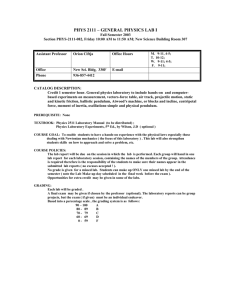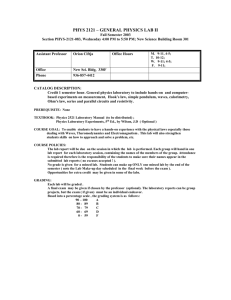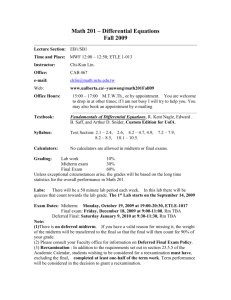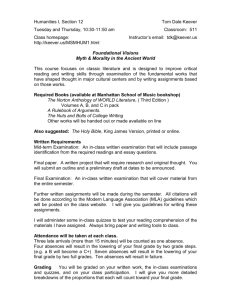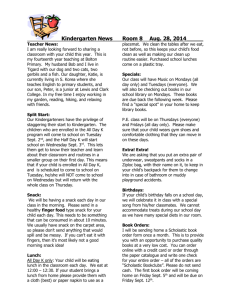GCCR_PSY_456_syllabus
advertisement
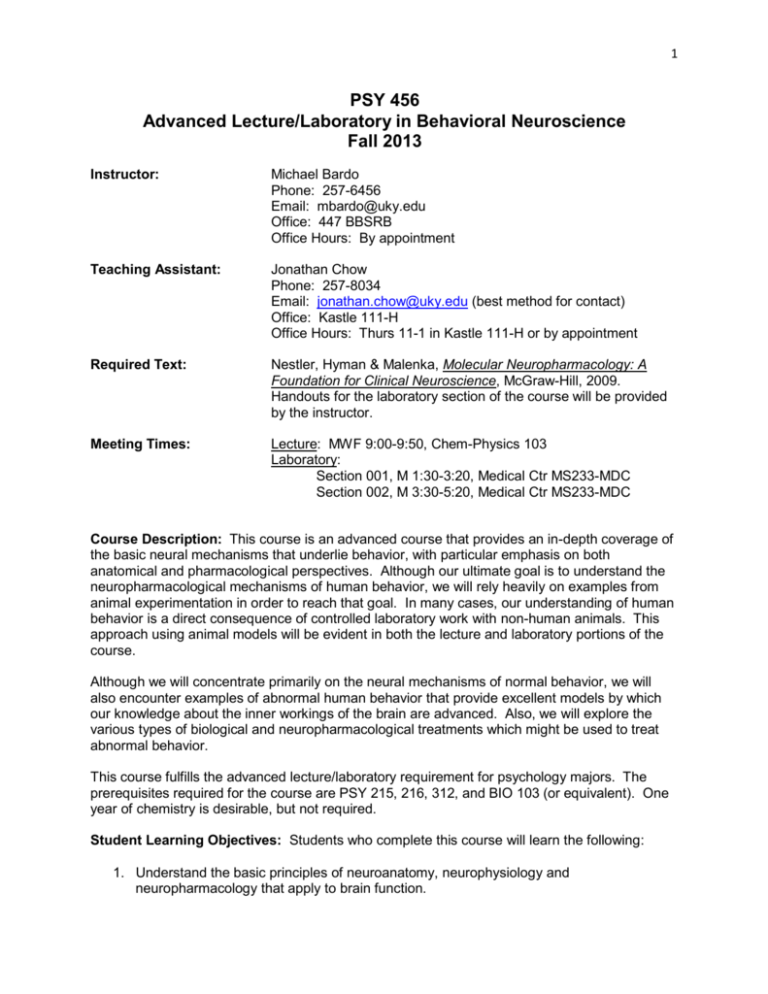
1 PSY 456 Advanced Lecture/Laboratory in Behavioral Neuroscience Fall 2013 Instructor: Michael Bardo Phone: 257-6456 Email: mbardo@uky.edu Office: 447 BBSRB Office Hours: By appointment Teaching Assistant: Jonathan Chow Phone: 257-8034 Email: jonathan.chow@uky.edu (best method for contact) Office: Kastle 111-H Office Hours: Thurs 11-1 in Kastle 111-H or by appointment Required Text: Nestler, Hyman & Malenka, Molecular Neuropharmacology: A Foundation for Clinical Neuroscience, McGraw-Hill, 2009. Handouts for the laboratory section of the course will be provided by the instructor. Meeting Times: Lecture: MWF 9:00-9:50, Chem-Physics 103 Laboratory: Section 001, M 1:30-3:20, Medical Ctr MS233-MDC Section 002, M 3:30-5:20, Medical Ctr MS233-MDC Course Description: This course is an advanced course that provides an in-depth coverage of the basic neural mechanisms that underlie behavior, with particular emphasis on both anatomical and pharmacological perspectives. Although our ultimate goal is to understand the neuropharmacological mechanisms of human behavior, we will rely heavily on examples from animal experimentation in order to reach that goal. In many cases, our understanding of human behavior is a direct consequence of controlled laboratory work with non-human animals. This approach using animal models will be evident in both the lecture and laboratory portions of the course. Although we will concentrate primarily on the neural mechanisms of normal behavior, we will also encounter examples of abnormal human behavior that provide excellent models by which our knowledge about the inner workings of the brain are advanced. Also, we will explore the various types of biological and neuropharmacological treatments which might be used to treat abnormal behavior. This course fulfills the advanced lecture/laboratory requirement for psychology majors. The prerequisites required for the course are PSY 215, 216, 312, and BIO 103 (or equivalent). One year of chemistry is desirable, but not required. Student Learning Objectives: Students who complete this course will learn the following: 1. Understand the basic principles of neuroanatomy, neurophysiology and neuropharmacology that apply to brain function. 2 2. Understand the relation between these basic brain mechanisms in the control of human behavior. 3. Develop an understanding about how diseases of the brain are manifest in human behavior and how these disease states may be treated biologically. 4. Develop knowledge about how basic research in laboratory animals is translated into useful information for advancing our understanding of human behavior. 5. Perform a simple experiment which (1) tests a hypothesis in the field of behavioral neuroscience, (2) provides data to write a scientific laboratory report, and (3) requires an exploration and critical evaluation of published scientific literature. Graduation Composition and Communication Requirement (GCCR) Psychology majors may satisfy the GCCR by taking a lecture/lab course in Psychology and earning an average grade of C or better on the GCCR assignments in the class. The courses that may be used to meet the GCCR are: PSY 427, PSY 430, PSY 440, PSY 450, PSY 456, PSY 460, or PSY 552. This course provides full GCCR credit for the Psychology major. The GCCR requirements include: 1. 2. 3. 4. a writing component; either a formal oral assignment or a visual assignment or both; an assignment demonstrating information literacy in the discipline; a draft/feedback/revision process on GCCR assignments The writing requirement will be met by the lab report that you submit on the research project at the end of the semester. This lab report should be at least 4500 words long (approximately 15 pages). The oral component will be met by the in-class debates (dates are noted in the syllabus and instructions will be handed out in class). A draft of the lab report (Introduction and Method) is due to the Teaching Assistant just before the Thanksgiving break. The TA will give you feedback on the paper. You should revise the paper based on the feedback, and submit a completed version as the final paper. The lab report should include at least eight published empirical studies related to your project (i.e., the information literacy component). The final paper is due on the Monday of Exam Week. 3 Grades: Grades will be assigned based upon performance in both the lecture and laboratory portions of the course according to the following breakdown: Lecture Points Laboratory Points Exam 1 Exam 2 Exam 3 Exam 4 Debate Practicum Lab Report TOTAL 75 points 75 points 75 points 75 points 50 points 75 points 75 points 500 points At the end of the course, the points from both the lecture and laboratory portions of the course will be totaled and a single overall grade will be assigned as follows: Total Points: 450-500 400-449 350-399 300-349 Below 300 Grade: A B C D E Based on the overall performance of the class, this grading scale may be curved downward so that at least 15% of students receive an A and 25% receive B. For the lecture exams, material covered in both the lecture and text will be included. The format of these exams will consist of objective (T/F, multiple choice and/or fill-in-the blank) and essaytype (definitions and/or short-answer essay) questions. These exams will be completed during the 50-minute class period. Make-up examinations are to be arranged with the instructor. In the lecture, we will also have a series of 4 different in-class debates on a controversial topic (e.g., the pros and cons of using Ritalin in children). Students will be assigned to a debate team consisting of 4 members each. Two teams will prepare and present brief arguments during the 50-min class period. Students who have more than one unexcused absence from the debate class will lose 10 points from their grade. The laboratory practicum exam will consist of identifying anatomical structures in sheep, rat and human brain materials provided in the laboratory. This exam will be conducted during the laboratory portion of the course. For studying the sheep and human brains, various atlases are available on the internet. 4 There will be a laboratory report, written in APA style, that summarizes the results of an experiment conducted in the laboratory portion of the course. Late lab reports will lose 5 points for each day late. Excused Absences: Students need to notify the instructor of absences prior to an exam when possible. S.R. 5.2.4.2 defines the following as acceptable reasons for excused absences: (a) serious illness, (b) illness or death of family member, (c) University-related trips, (d) major religious holidays, and (e) other circumstances found to fit “reasonable cause for nonattendance” by the instructor. Senate Rule 5.2.4.2 states that faculty have the right to request “appropriate verification” when students claim an excused absence because of illness or death in the family. Notification of absences due to university-related trips is required prior to the absence. Students anticipating an absence for a major religious holiday are responsible for notifying the instructor in writing of anticipated absences due to their observance of such holidays no later than the last day in the semester to add a class. Information regarding dates of major religious holidays may be obtained through the religious liaison, Mr. Jake Karnes (859-257-2754). Accommodation Due to Disability: If you have a documented disability that requires academic accommodations, please see me as soon as possible. In order to receive accommodations in this course, you must provide me with a Letter of Accommodation from the Disability Resource Center (Room 2, Alumni Gym, 257-2754, email address: jkarnes@email.uky.edu) for coordination of campus disability services available to students with disabilities. Inclement weather: If the class period of a scheduled exam is cancelled due to inclement weather, the exam will be rescheduled for the next class meeting Academic Integrity: Per university policy, students shall not plagiarize, cheat, or falsify or misuse academic records. Students are expected to adhere to University policy on cheating and plagiarism in all courses. The minimum penalty for a first offense is a zero on the assignment on which the offense occurred. If the offense is considered severe or the student has other academic offenses on their record, more serious penalties, up to suspension from the university may be imposed. Plagiarism and cheating are serious breaches of academic conduct. Each student is advised to become familiar with the various forms of academic dishonesty as explained in the Code of Student Rights and Responsibilities. Complete information can be found at the following website: http://www.uky.edu/Ombud. A plea of ignorance is not acceptable as a defense against the charge of academic dishonesty. It is important that you review this information as all ideas borrowed from others need to be properly credited. Part II of Student Rights and Responsibilities (available online http://www.uky.edu/StudentAffairs/Code/part2.html) states that all academic work, written or otherwise, submitted by students to their instructors or other academic supervisors, is expected to be the result of their own thought, research, or self-expression. In cases where students feel unsure about the question of plagiarism involving their own work, they are obliged to consult their instructors on the matter before submission. When students submit work purporting to be their own, but which in any way borrows ideas, organization, wording or anything else from another source without appropriate acknowledgement of the fact, the students are guilty of plagiarism. Plagiarism includes reproducing someone else’s work, whether it be a published article, chapter of a book, a paper 5 from a friend or some file, or something similar to this. Plagiarism also includes the practice of employing or allowing another person to alter or revise the work which a student submits as his/her own, whoever that other person may be. Students may discuss assignments among themselves or with an instructor or tutor, but when the actual work is done, it must be done by the student, and the student alone. When a student’s assignment involves research in outside sources of information, the student must carefully acknowledge exactly what, where and how he/she employed them. If the words of someone else are used, the student must put quotation marks around the passage in question and add an appropriate indication of its origin. Making simple changes, while leaving the organization, content and phraseology intact, is plagiarism. However, nothing in these Rules shall apply to those ideas which are so generally and freely circulated as to be a part of the public domain (Section 6.3.1). LECTURE SCHEDULE Date Topic Chapter Readings Aug 27, 29 Sept 1 Sept 3 Sept 5 Sept 8 Sept 10 Sept 12, 15 Sept 17, 19 Sept 22 Principles of Pharmacology No Class (Labor Day) Cellular Communication No Class Laboratory Preparation Cellular Communication (continued) Synaptic Transmission Signal Transduction EXAM I 1 Sept 24, 26, 29 Oct 1, 3, 6 Oct 8, 10 Oct 13 Oct 15 Amino Acids Acetylcholine and Monoamines Neuropeptides Autonomic Nervous System EXAM II 5 6 7 9 Oct 17, 20 Oct 22, 24 Oct 27, 29 Oct 31, Nov 3 Nov 5, 7 Nov 10 Neuroendocrine System Pain Sleep Cognition Mood and Emotion EXAM III 10 11 12 13 14 Nov 12 Nov 14 Nov 17, 19, 21, 24 Nov 26, 29 Dec 1, 3 Dec 5, 8 Dec 10, 12 Dec 17 (Tueday, 8:00 AM) Debate Set-up Reinforcement and Addiction DEBATES No Class (Thanksgiving) Reinforcement and Addiction (continued) Psychosis Neurodegeneration EXAM IV 2 2 3 4 15 15 16 17 6 LABORATORY SCHEDULE Date Topic Sept 1 Sept 8 Sept 15 Sept 22 Sept 29 Oct 6 Oct 13 Oct 20 No Laboratory (Labor Day) Laboratory Preparation (Start in CP 103 at 9:00 AM) Surface Structures (sheep and rat) Midline Structures (sheep and rat) Coronal and Horizontal Structures (sheep and rat) Human Brain Full Review PRACTICUM EXAM Oct 27 Nov 3 Nov 10 Nov 17 Nov 24 Overview of Experiment Video of Surgery and Ethics in Biomedical Research No Laboratory (Instructor Performs Surgeries) Behavioral Data Collection (Kastle Hall) APA style – Draft of Introduction & Methods due Feedback on paper/Data Analysis and Scientific Graphing No Laboratory (Work on Papers) FULL LAB REPORTS DUE Dec 1 Dec 8 Dec 15 (5:00 PM)


